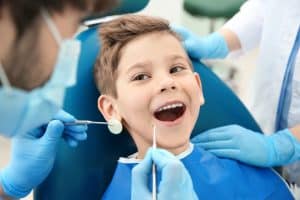Teeth grinding is a common phenomenon that affects many children. The causes are usually psychological and an adapted treatment must be put in place to prevent a deterioration of the teeth.
Find out what causes bruxism and how to avoid grinding your teeth.
What is bruxism?
The word bruxism probably doesn't mean anything to you. However, it is a psychological dental disorder that affects between 10 and 20 percent of young children.
Bruxism is the medical term used to refer to teeth grinding. People with bruxism clench their upper and lower teeth very hard and move back and forth.
A distinction is made between daytime bruxism and nocturnal bruxism. The latter is the most serious type.
Mild bruxism is fairly harmless and has no serious consequences on a child's teeth.
Frequent teeth grinding, on the other hand, can cause :
- Headaches,
- Wear and tear of the teeth,
- Fractures in the teeth,
- Jaw disorders,
- Muscle pain.
What causes bruxism?
The causes of bruxism are not fully established by specialists. It may be due to a combination of psychological, genetic and/or physical factors. Sometimes, intestinal worms can be the cause.
Teeth grinding can be caused by high stress, frustration, anger or any other emotion that the child experiences on a daily basis.
By grinding his teeth, the child can relieve himself of excess stress.
It is important to diagnose the cause of bruxism in order to propose an appropriate treatment.
How to avoid grinding your teeth in a preventive way?
There is no specific treatment that can drastically stop teeth grinding in children.
In case of frequent nighttime bruxism, the child can wear aligners (braces) at night. This is the most effective way to reduce tooth wear.
However, the combination of certain relaxation techniques and a good lifestyle and sleep habits can prevent bruxism.
A good lifestyle and sleep hygiene
In particular, limiting access to stimulants before bedtime is recommended, including:
- Phones,
- Television,
- The computer,
- Video games,
- Soda or any other stimulating food,
- Etc.
To promote sleep and reduce teeth grinding, it's best to limit your child's physical activity before bedtime. In addition, they need at least eight hours of sleep and a quiet room.
Relaxation techniques
Relaxation and meditation techniques have been shown to reduce bruxism.
The goal is for the child to be able to become aware of his posture, breathing and muscle contractions. In this way, they are able to reduce teeth grinding by relaxing their jaw muscles.
Relaxation is also a powerful tool to reduce stress, which is one of the main causes of bruxism.
The causes of bruxism are different from one child to another. It is important to consult a dentist specialized in this type of disorder in order to set up an adapted treatment.
When should I see a dentist?
It is common for children to grind their teeth from time to time. This is a normal phenomenon that usually has no harmful consequences.
If your child grinds his or her teeth frequently or at night, it is advisable to consult a dentist.
The dentist can determine the severity and cause of bruxism in children after an oral examination.
Based on his or her observations, the dentist will suggest a treatment that will reduce the grinding of the teeth and protect the child's teeth.


